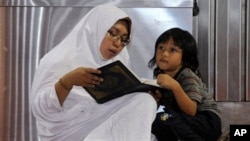For hundreds of millions of Muslims, this week marks the start of Ramadan, the Islamic month of fasting and praying. In some Middle Eastern countries, government and business virtually shut down during Ramadan, but in Indonesia, with the world's largest Muslim population, work for the most part goes on unaffected.
On Wednesday, the first day of Ramadan, loudspeakers broadcast the call to prayer at the Sunda Kelapa mosque in Jakarta, but the scene is quieter than usual.
The food vendors and merchants who usually line the entrance to the mosque are gone. There is little demand for their products during the Islamic holy month, when Muslims focus on fasting and spiritual introspection.
Hananto Prasetyo says Ramadan is special time for Muslims. He says in this one month they evaluate and test themselves, from desire and other forbidden things, to get closer to God.
Away from the mosques, few concessions are made to accommodate the sacrifice Muslims in Indonesia make during Ramadan.
Some Muslim majority countries basically shut down for the month to allow people to rest and pray. History professor Azyumardi Azra at the State Islamic University says that is not the case in Indonesia.
"In the few early days of Ramadan of course life is getting slower a bit for a few days, but, and then probably on Monday next week life is getting back to normal,” said Asra. “It is different from fasting in Ramadan in many Middle Eastern countries because in many Middle Eastern countries people are awake all night and then they sleep all day.”
Indonesian Muslims like Edi Hadiman must perform their religious obligations in addition to regular jobs. And he says that is the way it should be. He says it is a test for Muslims, but religious people should remember that it is difficult to get into heaven.
There are some restrictions on businesses in Indonesia. Most bars and nightclubs must either shut down or stop selling alcohol.
Some strict Muslim groups, such as the Islamic Defense Front or FPI, have tried to enforce these restrictions in the past by raiding bars and restaurants.
Azra says these groups are supported by authorities who want to been seen as standing up for Islamic values.
"They have some kind of collaboration. In fact now they ask FPI and other groups to help the police. So they use them actually. The police use them. So I think this is not appropriate, you know you cannot use this group as supporting police,” Azra added. “The police should enforce law and order without involving this kind of group.”
But he says for the vast majority of Indonesians observing Ramadan is personal choice that reinforces Islamic values of tolerance and peace.
Indonesians Begin Ramadan Observance

Work for most part unaffected in country with world's largest Muslim population



